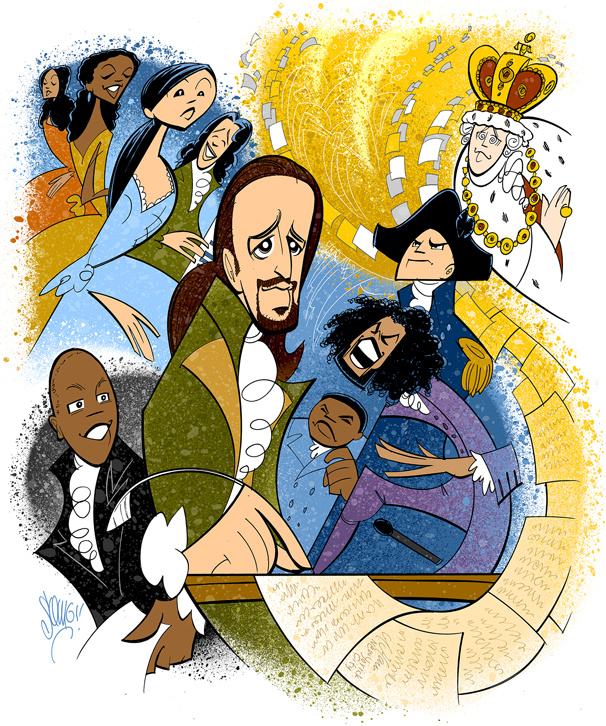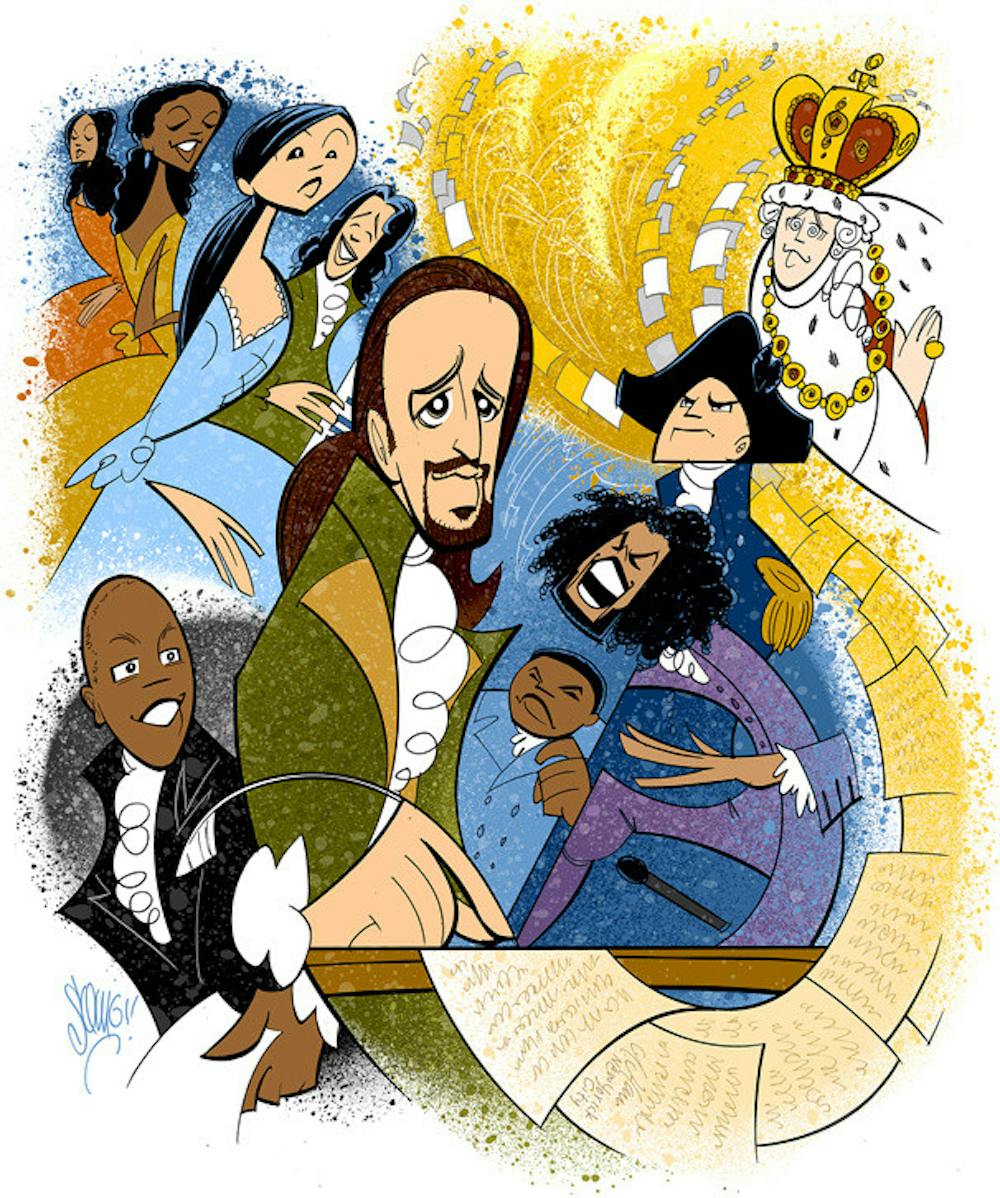
The first blog post I wrote was terrible, a 4,000-word dramatic analysis of Hamilton, which you have definitely heard of by now. Based on the cast album, released in September 2015, I gave it a glowing review.
Months later, Hamilton is a force of insane ticket sales and politicized power. Months later, I've been a second gen immigrant away at college in the Midwest for two semesters. Months later, Hamilton has been nominated for 16 Tony Awards -- the most in Broadway history, and in every category possible for a new musical.
But in terms of its seemingly radical social message and the realities of history and identity, Hamilton is a disaster.
In theory, in the bounds of theater, Hamilton is a good musical. I don't know enough about music theory and definitely know next to nothing about rap, but as a student of theater and a writer, I can recognize the craft of Lin-Manuel Miranda's lyrics. In terms of the musical's book, Hamilton isn't fantastic, but no one expected 30 years of AP U.S. history to make a riveting stage show to begin with.
In practice, as a force for social change, Hamilton is dangerous.
Its primary flaw is in its premise, which I praised to the high heavens back in October: people of color reclaiming American history.
Black and Latino actors play the founding fathers, black and Latino actors populate the ensemble. One Asian actress plays Hamilton's wife, Elizabeth Schuyler. This is the first time in living memory that a cast this large and diverse has succeeded on a Broadway stage.
It's a diverse cast, sure. Is it a diverse cast of characters?
Absolutely not.
In casting black men as Jefferson and Washington, you're casting black men as white men and using black bodies to tell white stories. And isn't it more than a little suspect, to cast a black man as an actual slaveowner and slave-rapist? Maybe, if bodies could roll in graves, Jefferson would be upset by that. Maybe. But casting the oppressed in the role of the violent oppressor does not read as empowerment. It's more a form of cannibalism.
The concept of reclamation itself is dubious. I gave a nauseating affirmation of the idea at the end of my earlier analysis. But who are we reclaiming history from? Was it taken from us? What does taking it back mean?
Is it the place of a non-black Latino man to tell white history with black music?
Probably not.
The principal players of Hamilton are mostly black, the exceptions being Miranda as Hamilton and Phillipa Soo as Eliza -- curiously, the two people with "Hamilton" in their names.
As a non-black person, as a fellow child of immigrants, I am not comfortable with Hamilton. I feel like an interloper. The Philippines has its own rap, but Filipino rap is only a recent addition to our long history of anti-black racism and appropriation of black culture. I believe Miranda can claim some right to rap, some small degree of ownership, and I think he respects it. But he cannot claim to write a musical for all Americans of color when his score borrows from rap, hip hop, R&B and jazz.
He and I are both interlopers, in my view. I myself make no claim to American revolutionary history. My family's American identity started when my parents separately came to America in the '80s. I don't feel a need to "reclaim" a portion of history fraught with anti-black racism. It's not mine. My blood was not on this soil at the time, and I don't have a place in a slave narrative. Neither does Miranda.
Miranda's libretto insists on reminding us that Alexander Hamilton was an immigrant, but Hamilton's immigrant experience was different from that of my and Miranda's parents.
Beyond conceptual flaws, the Hamilton fandom is repulsive and largely responsible for its political might.
Hamilton luxuriates in praise, with all criticism buried under accolades and sound bites. Questions of historical accuracy crumble under the force of #Ham4Ham videos, questions of morality are lost amidst a cast road trip to the White House, questions of revolutionary legitimacy are forgotten because Miranda was on Last Week Tonight, and every levelheaded critic of Hamilton's political agenda is drowned out by kids on Tumblr drawing fan art.
The Hamilton fandom is more than white kids on Tumblr and in dorm rooms who have every word of the score memorized. It's the long line of white celebrities and white politicians who make seeing Hamilton a social and moral achievement. It's white theater critics like Ben Brantley affirming Hamilton as a history-making piece of theater.
The first whispers of discontent I heard came from black people. Black non-theater people, who aren't doe-eyed for Miranda or insulated in white culture. These were tweets and Tumblr posts lost to me now, and critics as merciless as theater scholar James McMaster and mild as NPR Code Switch's Gene Demby are also lost because Hamilton has made Tony Awards history.
In Michael Paulson's NYT piece, I saw something I thought I'd never see: a defeated Andrew Lloyd-Webber.
Backstory: I hate Andrew Lloyd-Webber, the man behind Cats and The Phantom of the Opera. Not only are his shows the very essence of Cameron Mackintosh's commercialized, money cow theater, they're mostly ridiculous, and his credibility as a composer has decreased rapidly. He's a running joke to my circle of elitist theater friends. He's also ideologically repugnant, as a Conservative peer of the House of Lords who voted to cut taxes that fund low-income subsidies.
His School of Rock musical, other than being an embarrassment, stands no chance against Hamilton, and he knows it. "We call it the HamilTonys, and we know this is as far as we can go, but it’s great to have got this far," he said over the phone. I actually fell off my bed reading that. He's given up. The unsinkable Baron Lloyd-Webber. It's like watching a villain die in the least satisfying way.
I don't care about School of Rock, though. I know our friend Alex Brightman is up for lead actor. He's a delight, but he doesn't stand a chance. No one does, least of all shows and performers that deserve recognition. Not even the plays, exposure-wise. Viewership of the CBS Tonys broadcast is suffering, and Hamilton will resurrect it, but a Tonys ceremony where Hamilton sweeps is boring, low-stakes and a disservice to the greater theater world.
Awards ceremonies, on principle, are stupid. But the Tonys have a much more dramatic sway in terms of its commercial power because dowdy white couples in the Midwest plan their trips to New York around Tony wins. Hamilton does not need the help. It's sold out for the forseeable century.
For instance, the Sara Bareilles musical Waitress is, based on her Songs from Waitress album, close to perfection. It’s Hamilton’s only real competitor in the Best Musical category. This Broadway season has been blessed with excellent musical and play revivals, like Fiddler on the Roof with a politically relevant framing device on the refugee crisis and Deaf West’s Spring Awakening. There’s two avant-garde revivals of Arthur Miller plays directed by Ivo van Hove, who directed my man David Bowie’s musical Lazarus. The new play The Humans, featuring IU alum Arian Moayed, was egregiously snubbed for the Pulitzer for drama, and the London transfer of the very British, politically ballsy, #edgy King Charles III stands as a strange imperial neighbor to Hamilton.
All of these shows will be ignored.
Hamilton boasts multiple nominations in the male actors' categories, including Jonathan Groff in his novelty role as an effeminate George III. The one white guy in Hamilton is nominated, but six-time Tony winner Audra McDonald, statistically likely to give a Tony-worthy performance if she's on a stage, was not nominated for lead actress for Shuffle Along.
This is the most glaring bruise. Two other musicals got meager nods this season: Shuffle Along and The Color Purple. The Color Purple, of course, is the musical adaptation of Alice Walker's novel, a landmark of black lesbian literature. Shuffle Along, or, the Making of the Musical Sensation of 1921 and All That Followed is a new musical that's exactly what the title says. Both musicals are about black people, written mostly by black people and have almost all-black casts. Both musicals are black people telling their stories with black music. Both musicals are critically acclaimed by the same people who reviewed Hamilton.
And yet, theatergoers see Hamilton. As James McMaster said, "How many one-percenters walk away from Hamilton thinking that they are on the right side of history simply because they exchanged hundreds of dollars for the opportunity to sit through a racialized song and dance? My guess: too many."
Hamilton is not radical. It plays to white fantasy, to white America's weird fetishization of founding fathers and helps white people plagued by white guilt sleep at night, absolved of their part in the institution of racism. Its claim to represent all Americans of color prescribes a relationship to history that is not universal. It's far from perfect and far from the pinnacle of progress, and it does not deserve its social gravitas, political power or credit for artistic revolution, least of all Tony Awards or a Pulitzer Prize.





